1.
Before I left London for Porto, Martin Sherman suggested I read South African writer Damon Galgut’s In a Strange Room while on my pilgrimage. “I think it will speak to you,” he said. Martin’s memoir, On the Boardwalk, is being published in September by British publisher, Inkandescent, and the PDF copy he sent me is on my reading list with a batch of other memoirs during my three-month stay here in Morocco that began Monday night on my arrival in Tangier - Barry Diller’s Who Knew, Graydon Carter’s When the Going Was Good, Keith McNally’s I Regret Almost Everything, Jeffrey Seller’s Theatre Kid, and W. Graham Robertson’s Time Was.
Martin was right - as he so often is.
The book has spoken to me.
Before arriving in Tangier, I was already listening intently to its voice, that of both the writer and the character based on him and his travels as a young man, as a middle-aged man, and as an older man who was not old, not really, as long as he kept moving onward - keeps moving onward - always circling back to the deepest stranger he is struggling most to know: himself. In my last LETTER FROM PORTO I wrote of “hone” and “home” and in this sentence in this one I write of the tone of this tome - elliptical, elegiac, it too honed both in its structure (it is 180 pages) and in the search for the home of self by focusing on how others intersect with it and its service to those others as an act of generosity as well as avoidance. The book’s subtitle is THREE JOURNEYS and they are divided into sections identified as “The Follower,” “The Lover,” “The Guardian.”
Galgut, who won the Booker Prize in 2021 for The Promise and was shortlisted for In a Strange Room - also engages in a dizzying literary maneuver. He uses both “I” and “he” - sometimes in the same sentence - when addressing the reader in the writer’s voice about the man who journeys forth in the book. That separate sameness also spoke to me, how I can be - must be - both participant and observer as a writer honing a life and making a home within in it any way possible as long as he can wake up and head to a table or a desk and drink some coffee and concoct the sentences that draws me further into a day that is the latest bit of farther he has gotten in my life, that melding that takes place before the realization of everything connecting all about me because he is the conduit for its connection, for ours.
Even the reading of this book had a couple of extraordinary everything-connects moments. I am not sure how to explain them other than the force that maneuvers us in our lives - when we surrender mindfully to being maneuvered - is indeed a powerful one. I have called such moments Heightened Coincidences in the past. There are other words for them when they so calmly settle into our unsettled state as humans who are always honing that sense of home - grace, benevolence, God. Sometimes for me it can feel as if I have become the prayer having forgotten to pray. It is a nudge to acknowledge something other than the self even as the knowledge of one’s self is so embedded in its nudging.
I was sitting on the tarmac in Casablanca inside the little prop plane where the few of us had been ferried waiting to take off for Tangier. It was around 11 p.m. I was on the last leg of a long day of travel. Tired but not quite sleepy, I opened Galgut’s book to the page I was then on, 160, since I had read a large chunk of it on the plane from Porto to Casablanca. I continued to read. And sitting inside that prop plan on that tarmac there it was on the page: Morocco. At the end of the book, I was surprised to discover as I arrived here, that the country plays a mysterious narrative role without any need for its fully being explained because Morocco itself can’t be, just as love and grief and fate and the search for connection can’t. But it’s that can’t that can explain the reason one writes. The reason I do. Language becomes for me the longing to understand what I really cannot, the wordy wonder of it. Writing is for me another kind of surrender, and the same.
I stayed the rest of Monday night into Tuesday at the Miranda Hotel in a room I had booked in the Free Zone next to the Tangier airport upon my arrival because it was by then after midnight and it was just easier to arrive like that and have a leisurely breakfast there the next morning before a person at its front desk called a taxi to take me into the kasbah - which is how I arrived last year as well. It is a routine and a hotel familiar to me now - as is the kasbah - since I had to direct the disoriented taxi driver to where we were going yesterday. A very different - but same - arrival than last September since I had no idea where I was in this exotic city back then as I searched and searched, so lost, so very lost, for my hostel within the Medina.
Before the cab arrived yesterday and after breakfast, I still had an hour to spare so sat out on my hotel room’s terrace and finished Galgut’s book. I was stunned by its closing not only for its beauty but also how it ends in a cemetery in Morocco because that is where the writer as his character after many journeys through many countries have found themselves at the graves of two strangers, and the story climatically accrues into the mysteries of everything connecting without having to be explained.
I marveled at my having finished the book on that terrace on that morning in this same country where his he and his I narratively were and where mine now are.
“What a remarkable morning,” I whispered, a welcome.
Words.
Wonder.
And, less lost, I wiped away my tears, his.
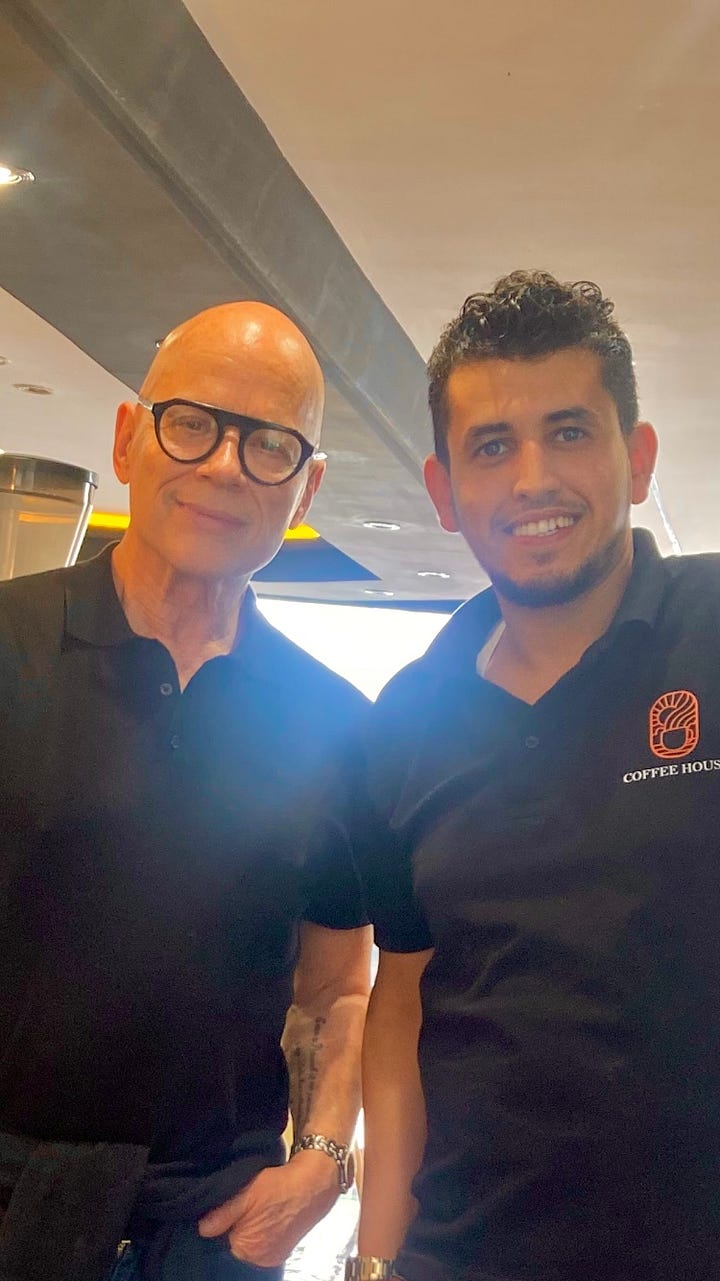
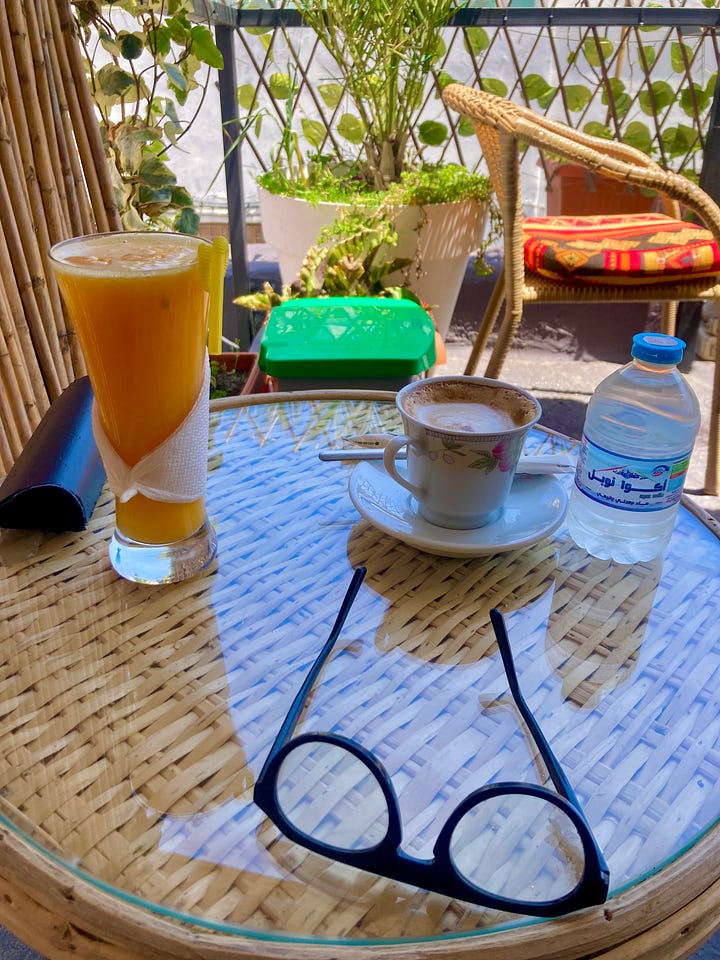
2.
I am staying in a beautiful apartment in the kasbah that a kind friend is allowing me to use for almost my whole time here in Tangier this summer except for the couple of weeks she will be here herself. More gratitude on my part. More wonder. Her first week of return begins around the 10th when she’ll be back finalizing a purchase of a home here. And the next one is in July when the one-night only benefit production of a play directed by Rob Ashford is performed annually on the grounds of designer Veere Grenney’s beautiful estate. Madison Cox, the garden designer and writer, who lives much of the year in Morocco, spearheads it and the proceeds this year go to Association Creche de Tanger, Association de Lutte contre de SIDA/ALCS Tanger, and the American Legation in Tangier. The cultured, socially conscious tribe - after finding the appropriate bit of couture in their closets - flies in from all over the world to attend. This year the play is The Cherry Orchard and it will star Sir Kenneth Branagh, Sir Derek Jacobi, Dame Penelope Wilton, Luke Thallon, and Gillian Anderson. I am still trying to figure out a way to go to that myself without using the word “finagle” since it has long been sold out. Hell, I’ll even volunteer to sing for my supper and play a bit part and call forth my Juilliard Drama Division past as an actor. In fact, I’d kind of love that. I’d even serve dessert to see that production. So stay tuned for more about that. (After I wrote those sentences - almost precisely at the same time I was doing so - I got a text and was offered the last ticket available in the least expensive price category that had suddenly become available in the balcony section. More gratitude. More wonder.) I’ll move back into the hostel I stayed in last year for the two weeks my friend returns to her place here in the kasbah as part of my Cinderella existence and sweep the hearth a bit before moving back to the beautiful apartment with its stunning views. Chekhov. Gillian. Jacobi. Cinderella slipping on her slippers for one night. Tangier can just keep surprising you.
I surprised Mohammed above when, after putting down my bags in the apartment on Tuesday morning after another kind friend met me with the keys, I headed down the hill to the Coffee House where I’d often sit last year and write for a couple of hours. A barista there, he broke into a big smile when he saw me and even gave me this big glass of fresh orange juice for free as a welcome back gift. As I was leaving, I made sure his name was Mohammed and I was remembering that correctly. He affirmed it and I joked that it was like being named Joe in America. “Mohammed meet Mohammed meet Mohammed,” I mumbled good-naturedly as a kind of Moroccan mantra.
I asked his coworker to take this photo of us. When he finished taking it on my phone, I asked the coworker what his name was. “Mohammed,” he said.
We all broke into one giant laugh.
“That was like a scene out of movie,” I said. “ … aaaaand cut …”

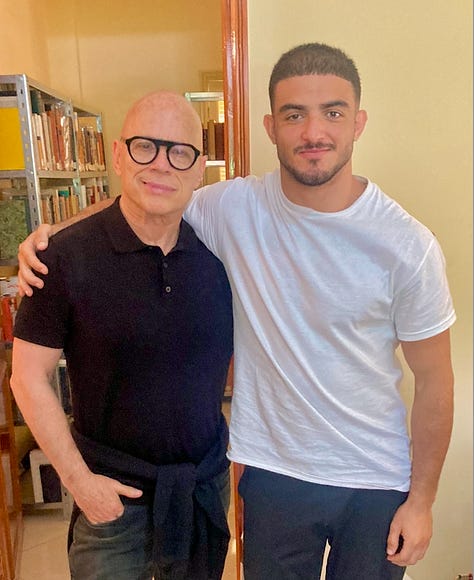
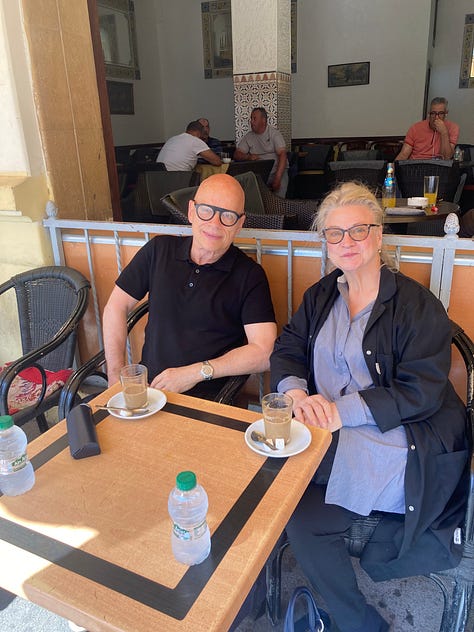
3.
After visiting with Mohammed and Mohammed at Coffee House, I kept walking through the kasbah to meet up with Jane Stubbs and her assistant Ali at the annex of the American Legation’s library. Jane - she of the now legendary Upper East Side bookstore and gallery - is a fellow Mississippian who has been here for a while now organizing the Legation’s vast book collection. Or as Architectural Digest once put it about her: “Back in the 1980s and ’90s, one of Manhattan’s most sparkling personalities was Jane Kelly Stubbs, the drawlingly witty chatelaine of Stubbs Books & Prints, where out-of-print volumes by the likes of Cecil Beaton met outré art inside a two-story sliver of a 19th-century townhouse. Her memorable exhibitions drew uptown dames, downtown bohemians, and international eccentrics—The New York Times called the shop ‘Bloomsbury on the Hudson’ —all of whom mooned over the hostess’s pack of snuffling pugs, lolled on a deep-dish divan, and snapped up the life-enhancing oddities that were the shopkeeper’s signature, such as Some Favorite Southern Recipes of the Duchess of Windsor.”
After catching up with Jane and Ali a bit in their office at the annex, Ali took Jane’s beloved 16-year-old dog back to her apartment for her and she and I moseyed on down the street to the Cafe Colon and had a couple of cafe lattes at a sidewalk table as the varied aspects of kasbah life kept parading about in front of us. I was reminded of the Chekhovian sentiment in The Cherry Orchard. “Perhaps man has a hundred senses,” he wrote, “and when he dies only the five senses that we know perish with him, and the other ninety-five remain alive.” It is those remaining 95 that are so needed in Morocco to take it all in - the spices, the history of spies, the Muslim calls to prayer, the stray cats so myriad and motley, the quiet kindness in cadence with the need to be loudly cantankerous, the transactional traffic that must be navigated, the colors, the light, the sweet care the swaggering young have for their swaying elders, the elaborate doorways, the alchemical elegance of a jalabiya catching a breeze from the ocean and flirting just enough with their flutter which sculpts the air with something that resembles flight and the body with something earthier, throbbing, centered, not sinful but as close as it can get. Jane and I took it all in as she, at the same time, regaled me about her recent trip back home to Natchez for a family wedding. We talked politics and culture and how happy we were to be right there where we were in that very moment: havin’ a coffee, darlin’, in the kasbah.
4.
Above is a triptych of photos chosen from the many I’ve taken the past couple of days since being back. One of the hundreds of stray cats. Our waiter pouring our cafe latte at Cafe Colon the other day. And a mother and child heading home in the kasbah.
5.
This is my latest desk, the dining table with this view of the sea and the hills behind it where I arrive each morning now in this lovely apartment to begin concocting myself by concocting sentences.
“It happens like this,” wrote Damon Galgut in his own first sentence of In a Strange Room when he begins to describe his character’s walk to some ruins in Greece. I have told you how the book ends without telling you how it does. So I wanted to tell you how it begins … and how it doesn’t. “He set out in the afternoon on the track that has been shown to him and soon he leaves the little town behind,” Galgut continued. “In an hour or so he is among low hills covered by olive trees and grey stones, from which there is a view out over a plain that gradually descends to the sea. He is intensely happy, which is possible for him when he is walking and alone.
…
“He gets to the ruins in the middle of the afternoon. I can’t even remember now what they are, the remains of some big but obscure building, there was a fence that had to be climbed, there was a fear of dogs but no dogs appeared, he stumbles around among the rocks and pillars and ledges, he tries to imagine how it was but history resists imagining. He sits on the edge of a raised stone floor and stares out unseeingly into the hills around him and now he is thinking of things that happened in the past. Looking back at him through time, I remember him remembering, and I am more present in the scene than he was. But memory has its own distance, in part he is me entirely, in part he is a stranger. I am watching.”
6.
I watch.
7.
He does.
8.
Onward …





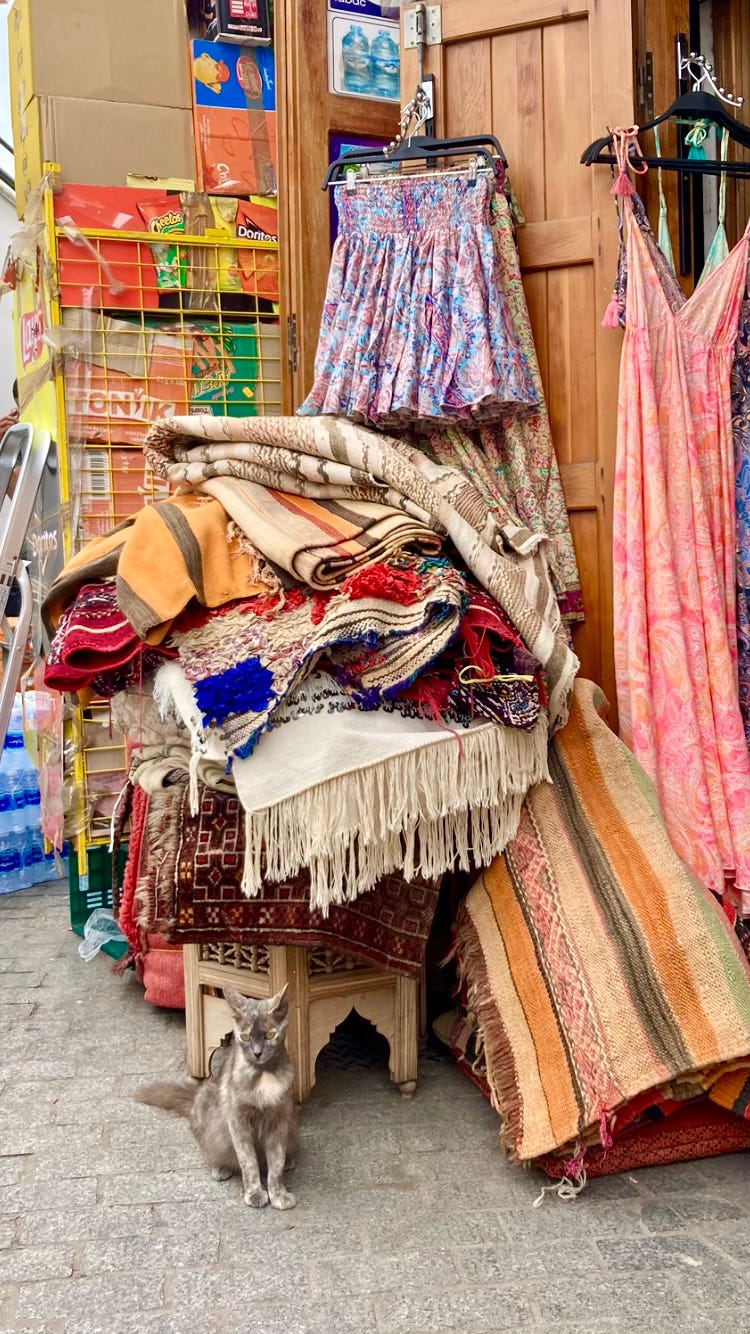
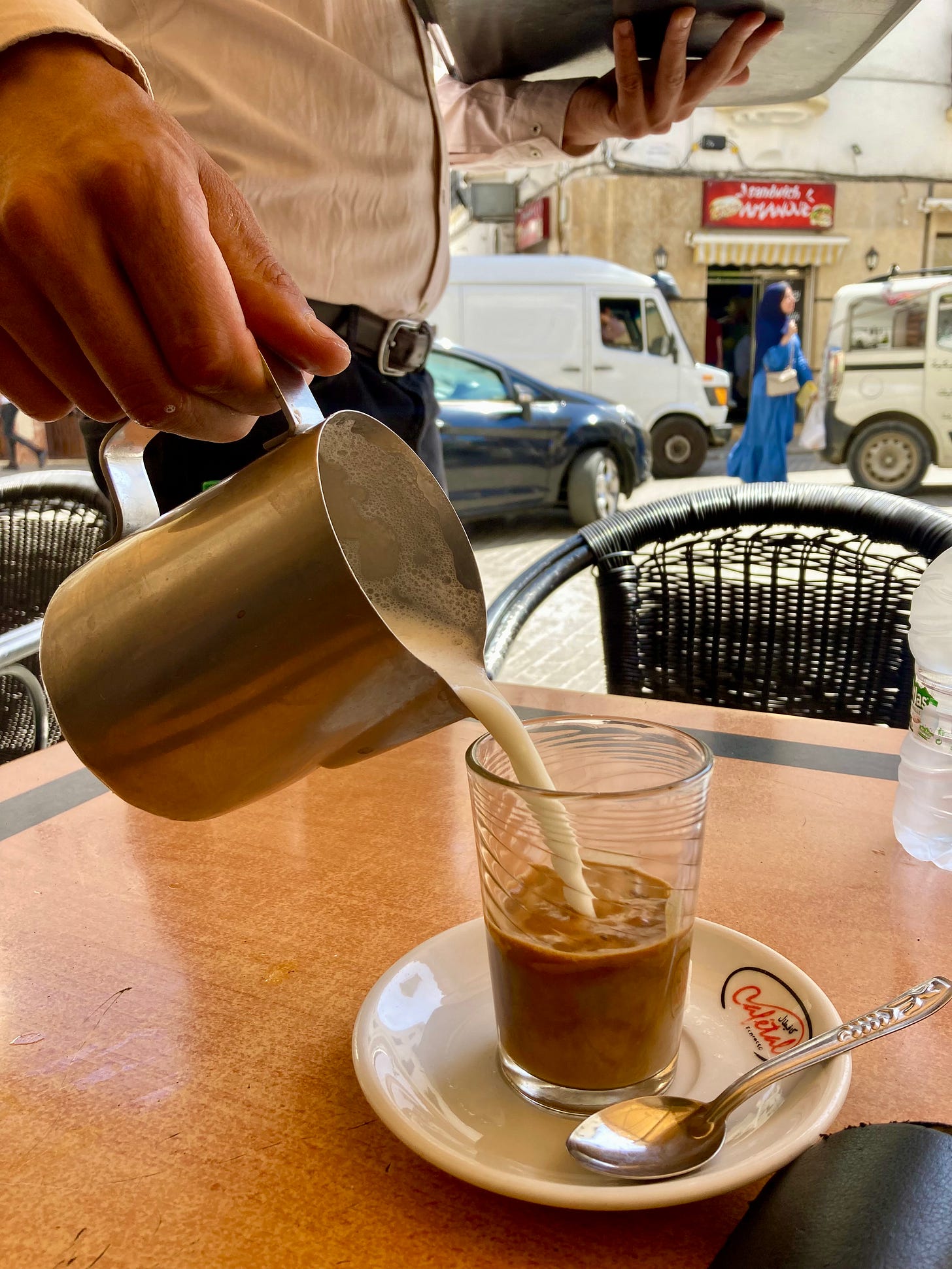

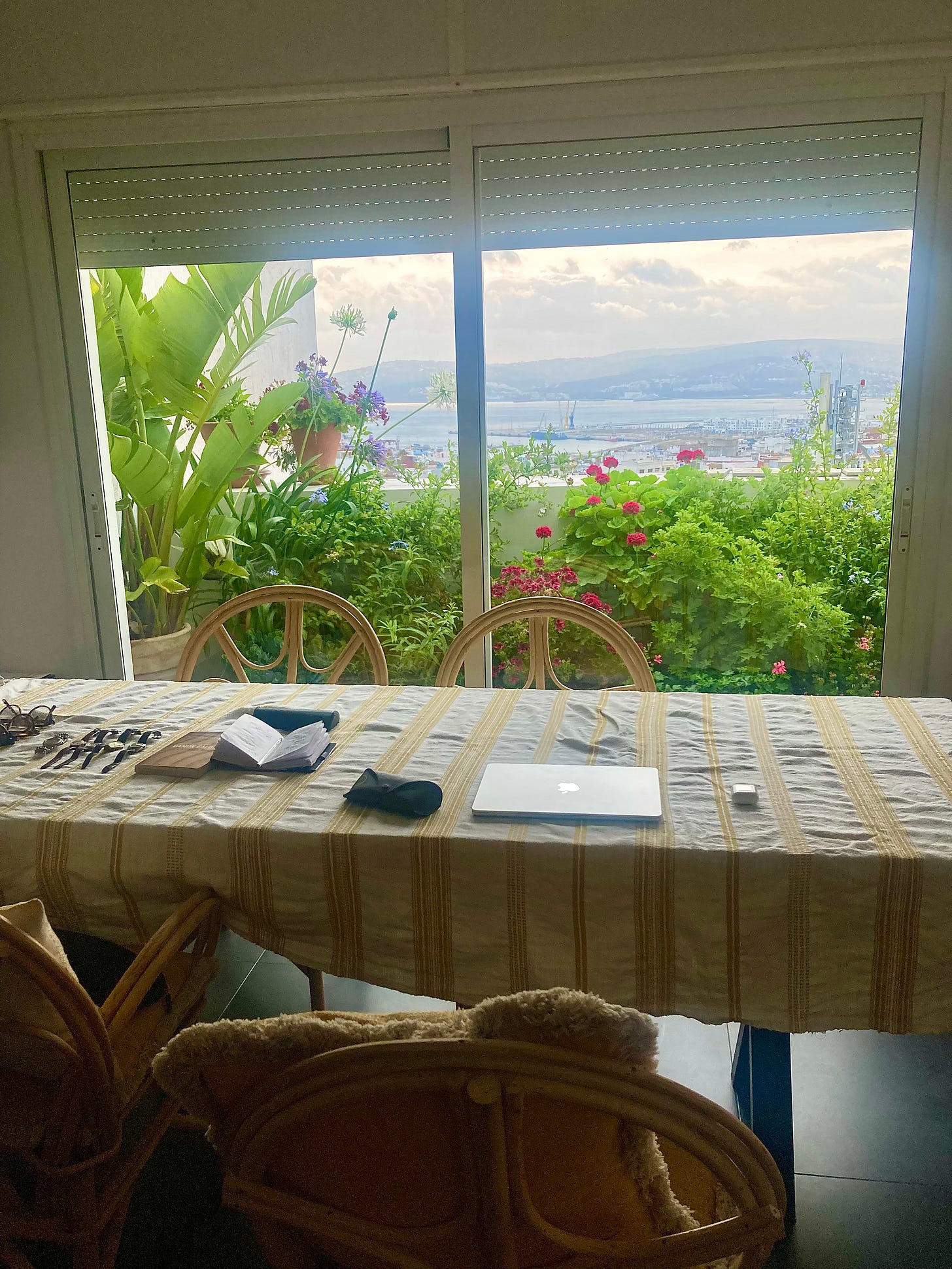
You seem at home.
This latest adventure touched me so deeply. I'm sort of completing an almost two year engagement with a Jungian therapist here in Lisbon. At this age (almost 72) the work is deeper and more joyful, and somehow your relating Galgut's book (I had not heard of him until now) resonates. I was able to buy it for my KINDLE just now, and can't wait to read. But first I have writing to do as well. THANK YOU KEVIN for your always ability to inspire.